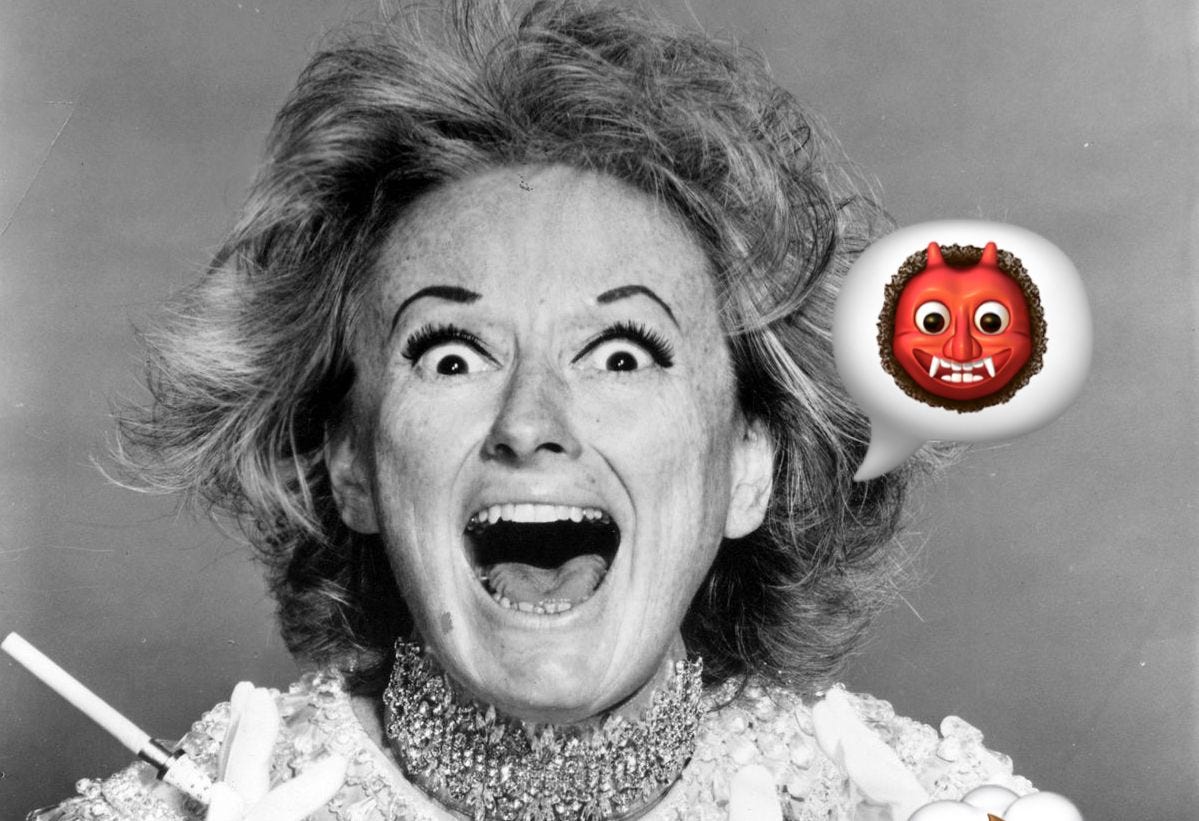
Phyllis Diller once said she became a stand-up comedian because she had a sit-down husband. Laziness was among Sherwood Anderson Diller’s better qualities. He was moody, abusive, unfaithful, and a marital rapist. His wife channeled all this into the character of Fang, her fictional husband so named for his single protruding tooth. Here’s how she described him:
I’ve been asked to say a couple of words about my husband, Fang. How about short and cheap?
Fang drops so much food on his ties, we keep them in the refrigerator.
Fang’s idea of a seven-course dinner is a six-pack and a baloney sandwich.
When we went to bed together it’s a case of the naked and the dead.
He staggered out of a bar one night, threw up on a cat, and said ‘I don’t remember eating that.’
Diller’s whole act was based on inverting the gender tropes of classic comedians: Henny Youngman said “take my wife, please!” so the kooky housewife asked audiences to take her husband. But not her actual husband.
“Just as I was the antithesis of the happy and attractive fifties housewife,” Diller explains in her memoir Like a Lampshade in a Whorehouse, “Fang flipped the image of the capable husband who was king of his castle, and I soon realized he was a beloved character.”
Fang wasn’t entirely fictitious, either. The jokes, Diller wrote, helped her cope with the reality:
No one knew I was living with an agoraphobic sex tyrant who couldn’t socialize and rarely held down a job. And not until the year of my retirement would I be aware that my stage act was actually a form of therapy. Boy, did I need it.
The problem was, Sherwood laughed loudest at the Fang jokes.
Everybody has always assumed that Sherwood was Fang — even Sherry assumed he was Fang, and he loved it. Oh honey, he wanted to be Fang. Years later, he’d receive a letter in St. Louis with no address listed, not even a town, just the name Fang, and he’d also have stationery with a Fang logo. He was in heaven. At last he’d been endowed with the importance he’d always wanted. Now he could go into a bar and say, “I’m Fang, do you wanna buy me a drink?”
He went even further, opening a bank account under the name Fang Diller. Finally, in 1965, she divorced him for what she told the press was “just plain old incompatibility.”
What’s the lesson here? Don’t dignify the butt of your joke. Sometimes, punching up gives your target a boost. If you’re the butt of someone else’s joke, see if you can get a free drink out of it. And if you can avoid it, don’t be a woman in the 1950s.
Quick quips; lightning
“Marriage is a great institution, but I’m not ready for an institution yet.” — Mae West
This is sketchily attributed to the silver-screen sexpot, but she won the quotation game early by identifying exactly the sort of thing she would have said.
“There are men who fear repartee in a wife more keenly than a sword.” — P.G. Wodehouse
Just lean into it.
“I married beneath me, all women do.” — Nancy Astor
A lesser-known quip from the woman who set Churchill up with the line, “If I were your wife, I would put poison in your coffee!” (“And If I were your husband, I would drink it!”)
Thanks for sinking your one long tooth into the eleventh issue of Get Wit Quick, the weekly file of fang-sharpening phrases. It’s highly compatible with my book Elements of Wit: Mastering The Art of Being Interesting. And like Fang, it’s short and cheap.



